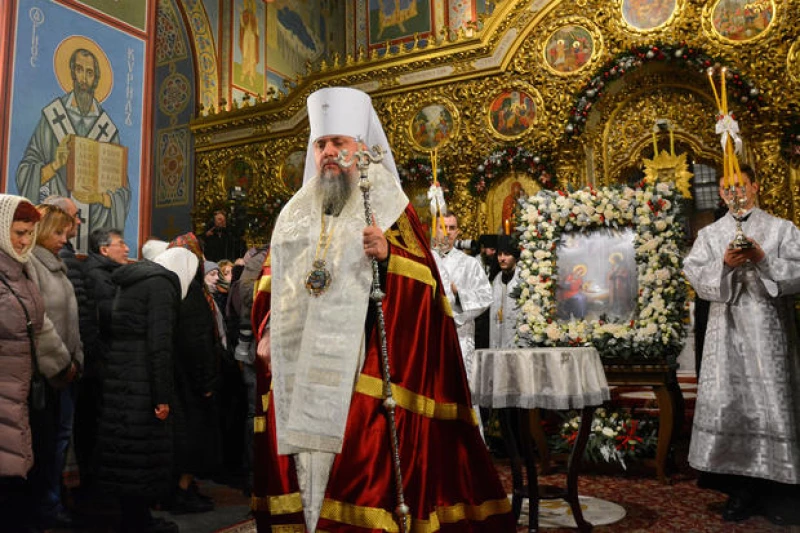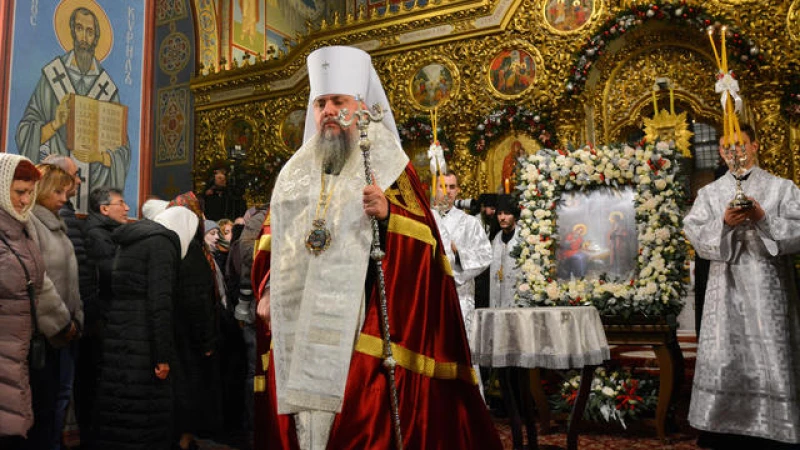Ukrainian Orthodox Christians Celebrate Christmas on December 25
Ukrainian Orthodox Christians attended services on Sunday as the country for the first time celebrated Christmas on December 25, after the government changed the date from January 7, when most Orthodox believers celebrate, as a snub to Russia.
"All Ukrainians are together," said Ukrainian President Volodymyr Zelenskyy in a Christmas message released Sunday evening. "We all celebrate Christmas together. On the same date, as one big family, as one nation, as one united country."

In the southern Black Sea port of Odesa, churchgoers prayed and lit candles as priests in gold vestments held Christmas Eve service in the Cathedral of the Nativity, decorated with fir trees and a nativity scene.
"We believe that we really should celebrate Christmas with the whole world, far away, far away from Moscow. For me, that's the new message now," said one smiling parishioner, Olena, whose son is a medic on the front line.
"We really want to celebrate in a new way. This is a holiday with the whole of Ukraine, with our independent Ukraine. This is very important for us," she told AFP.
Most eastern Christian churches use the Julian calendar, in which Christmas falls on January 7, rather than the Gregorian calendar used in everyday life and by Western churches.
Separately, Ukraine's air force said it shot down 28 Russian drones out of 31 launched from the annexed Crimea peninsula on Monday as well as had also shot down two Russian missiles and two fighter jets.
Zelenskyy signed a law in July moving the celebration to December 25, saying it enabled Ukrainians to "abandon the Russian heritage of imposing Christmas celebrations on January 7".
The date change is part of hastened moves since Russia's invasion to remove traces of the Russian and Soviet empires. Other measures include renaming streets and removing monuments.
The Orthodox Church of Ukraine formally broke away from the Russian Orthodox Church over Moscow's annexation of Crimea in 2014 and its support for separatists in eastern Ukraine.
The political rift has seen priests and even entire parishes switch from one church to another, with the new Orthodox Church of Ukraine growing fast and taking over several Russia-linked church buildings, moves supported by the government.
On Sunday evening, worshippers packed St Michael's Golden-Domed Monastery in Kyiv -- the headquarters of the new independent church -- for a Christmas service led by the primate of the Orthodox Church of Ukraine, Metropolitan Yepifaniy.
Ukrainians around the country voiced support for the Christmas date change.
Supporting Change in Ukraine
"We wanted to support what is happening in Ukraine now. Because changes are always difficult, and when these changes occur, more people are needed to support it in order for something new to happen," said Denis, a young man attending church in Odesa.
At Kyiv's Golden-Domed Monastery, Oksana Krykunova said that for her, after the invasion, it was "natural to switch to the 25th."
She added: "I just visited my parents -- my 81-year-old mother and 86-year-old father -- and they accepted it absolutely (normally)."
Embracing the Civilized World
In the western city of Lviv, which has been little damaged by the war, Taras Kobza, an army medic, said "We have to join the civilized world."
Tetiana, a singer in a traditional music group called Yagody (berries), agreed, saying, "I'm very happy that we are finally celebrating Christmas Eve and Christmas together with the rest of the world. It's really cool."
The Ukrainian Greek Catholic Church has also opted to hold Christmas services on December 25.
But the historically Russia-linked Ukrainian Orthodox Church is keeping the January 7 Christmas date. This church claims to have cut ties with Russia because of the war but many Ukrainians are sceptical.
Christmas Traditions in Ukraine
Under the Soviet Union, atheism was encouraged and Christmas traditions such as trees and gifts were shifted to New Year's Eve, which became the main holiday.
Ukrainian Christmas traditions include a dinner on Christmas Eve with 12 meatless dishes including a sweet grain pudding called kutya.
Traditional Ukrainian Christmas Celebrations
During the Christmas season in Ukraine, people engage in various customs and traditions that have been passed down through generations. One of these traditions is the decoration of homes with elaborate sheaves of wheat, known as didukh. These beautiful arrangements symbolize abundance and prosperity for the upcoming year.
Another important aspect of Ukrainian Christmas celebrations is the singing of carols called kolyadky. Groups of carolers, both young and old, go from house to house spreading the joyous Christmas spirit through their melodious voices. These carols often tell the story of the birth of Jesus and bring blessings to the households they visit.
In addition to the decorations and caroling, Ukrainians also carry decorations in the shape of stars during Christmas. These star-shaped decorations represent the Star of Bethlehem, which guided the Wise Men to the birthplace of Jesus. The stars are often made of straw or paper and are hung in windows or on Christmas trees.
Furthermore, many Ukrainians perform nativity scenes, reenacting the birth of Jesus. These scenes can be found in churches, homes, and even public spaces. They serve as a visual reminder of the true meaning of Christmas and allow people to reflect on the significance of the birth of Jesus.







